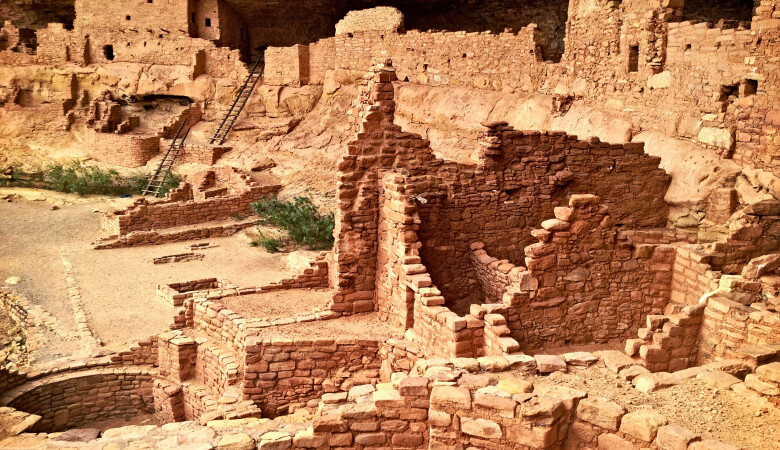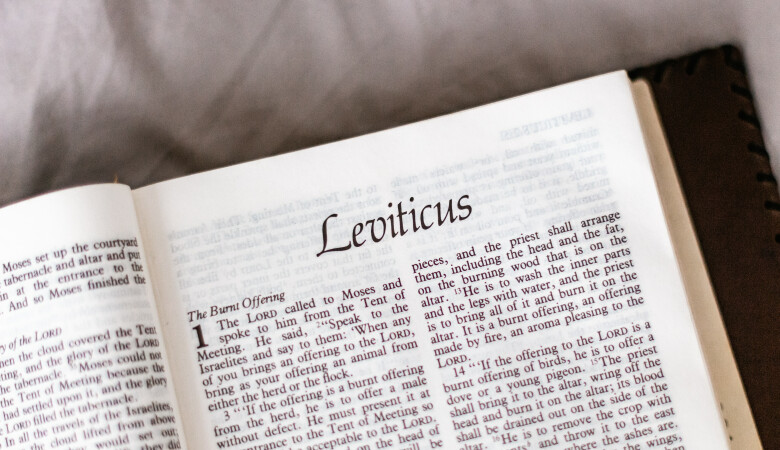Saving Faith Displayed Before the Flood, Part 2 (Hebrews Sermon 48 of 74)
November 20, 2011 | Andy Davis
Hebrews 11:4-7
Walk by Faith
What Does it Mean to Walk With God?
Scripture says, "He who walks with the wise grows wise," and I think that's why Hebrews 11 is given to us, so that by faith, as we read the accounts of faith-filled men and women of the past, we can walk with the wise and grow wise ourselves. For the last four or five weeks, I've been kind of walking with Enoch, especially him, trying to understand his faith, trying to understand his example. This is the one about whom it's testified that Enoch walked with God. And friends, there is no one wiser than God. And so, when you walk with the wise, you grow wise. Enoch walked with God.
Oh, the depths of the riches, the wisdom, the knowledge of God, how insatiable His judgments and His paths beyond tracing out, the infinite wisdom of God. And so, for me, I've been pondering that expression. What does it mean to walk with God? And some images come in my mind, something I read from a Puritan pastor some time ago, Thomas Goodwin. He's describing the way that God pours out His love into our hearts by the Holy Spirit, and the way that God testifies directly to us that we are His children, by faith and by the ministry of the Holy Spirit.
Thomas Goodwin was describing a father and a son walking together along the road and they are hand in hand. And the son knows that he is the son of his father, he knows that his father loves him, there's no doubt in his mind about it, he is absolutely secure in that love. And then suddenly, the father moved by some impulse, picks that little boy up and hugs him and kisses him and squeezes him, tells them, "I'll always love." Set him back down on the road. There's just a qualitative difference before and after, Amen?
And so, that image comes in my mind. When I think of walking with God, that's what I think of. Sometimes I'll even ask him in the name of that teaching I got, "Lord, would you do that to me right now? Just pick me up and squeeze me and tell me that you love me." I don't think there's anything wrong, I think there's everything right with a prayer like that. Well, then I think about Jesus and His post-resurrection appearance walking with two disciples on the road to Emmaus. Wouldn't you love to have been one of those two disciples, to just walk with Jesus? And not just at any time in redemptive history, but specifically that day, resurrection day, and to walk with the risen Lord and to sit down at table with Jesus and to break bread with him and eat with him.
Later on, we're going to have the Lord's Supper, that the... It's a symbol of the promise that we have that some day Jesus will do precisely that with us. Some day, he's going to sit at table with us. And so, walking with God, that's what's on my mind, trying to understand that. And both of the men that are in front of us today, in Hebrews 11, it's testified of both of them, Enoch and Noah, that they walked with God. Interestingly, it's an expression that's used of no one else in the Bible. Abraham says, "The Lord before whom I have walked…" And so Abraham walked in front of God or before him. I don't, in any way, doubt that Abraham walked with God. I'm just talking about the words, and it's said only of these two, Enoch and Noah. So we're going to study today. We're told that Enoch walked with God. We're told, in Genesis 6:9, that, "Noah was a righteous man, blameless among the people of his time, and he walked with God." And so for me, I want to understand how that can be. This God, this infinite God, this mysterious God. The God who is a spirit, and has not a body like us humans. No body parts or passions. A God who is a wind, a God who is a consuming fire, a God of whom, it said, "Heaven, even the highest heavens, cannot contain Him."
What does it mean to walk with God? That's what's in front of us today. Now, the first time that we have this image of God walking in the Bible, it's actually negative, it's an image of judgment. After Adam and Eve had eaten from the tree of the knowledge of good and evil, it says that they heard the sound of God as he was walking in the garden in the cool of the day, and they were terrified and they ran and hid from God. And what a great tragedy that is? If you think about it, what an incredible tragedy? They recognize the sound, and so they knew that fellowship of walking with God, but that fellowship had now been broken, they were terrified of walking with God because God was coming to judge them.
Little by little as Genesis unfolds, it seems that God recedes from human consciousness, takes further and further steps back. It seems that Cain and Abel had communication with God and Cain was able to talk to God and God to answer Cain, etcetera. But by the end of Genesis 4, it says, "At that time, men began to call on the name of the Lord…" And people are building altars, and they settled into that pattern that we know that ultimately you can only walk with God by faith. So little by little, only by faith. And so we have this basic principle of all of human experience with this invisible God. It's given in Hebrews 11:6, we've already looked at it, can't look at it too much. And that is "Without faith, it is impossible to please God because anyone who comes to Him must believe that He exists and that He rewards those who earnestly seek Him." And so a life that's well-pleasing to God, that's what's in front of us, that's the centerpiece of my life. I want to say to God at every moment, "Oh God, I believe that you exist. I want to please you, I want to come to you, I want you to reward me for the things that I've done. That's the kind of life I want to earnestly diligently seek you, oh God."
I believe that that's what's in front of us as we described this idea of walking with God, that at every moment of the day, every day of the year, someone who's walking with God is saying that to God. I just said a moment ago that God feels heaven, and even the highest heavens cannot contain God. I see in our society a force called secularism that forces God to take his place in a box, and tells God, "This is your place now, you stay put. Be a good boy and stay put. And don't get outside that box that we're going to put you in." But a Christian doesn't put God in any box, I want God in everything I do. I want God involved in every decision I make, every dollar I spend. Every minute of the day, I want God in the center of all of it. I don't believe in that kind of a vision. Some day, the glory of Jesus is going to radiate through the new heavens and the new earth. There'll be no part of it that doesn't radiate with Jesus Christ. So away with that way of living, I don't want to live like that. I'm not even worried about secular education or secularism or any of those things in the college. I'm worried about it in my own heart, that I would put God in a box and not bring him over into every area of my life.
So Hebrews 11:6 tells me that basic principle, and I say to you that this is, in essence, the only kind of life that ends up in heaven. This is the life that ends up in heaven. Do not be deceived. At the end of Hebrews 10, we are told very plainly, look at last two verses, verses 38 and 39, "But my righteous one will live by faith, and if he shrinks back, I will not be pleased with him. We are not of those who shrink back and are destroyed but of those who believe to the salvation of our souls." And then Hebrews 11 tells us what that faith looks like that saves our souls. And so these aren't just super-duper Christians or extra special Christian, this is the essence of the kind of life that leads to heaven, and it's a life in which we are walking with God.
Enoch: Faith’s Walk (vs. 5)
So look at verse 5, let's look at Enoch, in particular, "By faith, Enoch was taken from this life so that he did not experience death. He could not be found because God had taken him away. For before he was taken, he was commended as someone who pleased God." Now, we have this mysterious figure of Enoch. There's actually a very limited Biblical record of this man, we don't know much about him. We have this verse here in Hebrews 11:5. We have mention of him in the genealogical unfolding of Genesis 5, and there we find these words, "When Enoch had lived 65 years, he became the father of Methuselah. After he became the father of Methuselah, Enoch walked with God 300 years."
Now that has just weighed heavily on me. I said to some friends, this morning, I said, "I'd like to walk with God 300 minutes." Let's start with that, Amen? Let's start with 300 minutes and just build from there. "Enoch walked with God 300 years and had other sons and daughters. Altogether, Enoch lived 365 years. Enoch walked with God and then he was no more because God took him away." And then you have Jude 14 and 15 that tells us this about Enoch, "Enoch, the seventh from Adam, prophesied about these men" these kinds of false teachers, etcetera. He prophesied about them. So Enoch was a prophet. And Enoch prophesied, "Behold, the Lord is coming with thousands upon thousands of His holy ones, to judge everyone and to convict all the ungodly of all the ungodly acts they have done in the ungodly way, and of all the harsh words that ungodly sinners have spoken against him." That's Jude 14 and 15. That's is it. That's all we have about this man, Enoch.
What does the author tell us about Enoch and why has he brought forward in Hebrews 11? Well, Enoch, according to the author of Hebrews, is an example of faith, by faith, etcetera, etcetera, by faith, Enoch. So Enoch is an example of faith. And so we know that it is by faith that Enoch walked with God. Now, when we talk about walking with God, I think we're talking about the minutia, the details of everyday life. That's what the expression means to me. You're getting down to the nitty-gritty, the nuts and bolts, where we use the expression, "Where the rubber meets the road." Walking with God. So we use this kind of expression, taking steps, steps to, Billy Graham had a steps to peace with God kind of thing. So sometimes you break something up into steps or step-by-step instructions. It's almost Christmas time, you're going to be looking at those, step-by-step instructions. Look, in defense of the engineers that write, and first of all, they're just not really good with words, so you just have to cut them some slack. They generally aren't very good with language.
Second of all, in their defense, it's really hard to break something down step-by-step, it's hard to describe it. So do your best as you assemble whatever you're told to assemble with step-by-step instructions. But the point is very plainly, what we're talking about here is just step-by-step in your life. Left foot, right foot, left foot, right foot with God every moment. That's what it means to me, to walk with God. And this image, this metaphor of walking is huge in the Bible, it's not a minor theme. It's a huge theme.
The Patriarchs Walked With God
I've already mentioned concerning Abraham, it says, "When Abraham was 99 years old, the Lord appeared to him and said, 'I am God almighty, walk before me and be blameless.'" What he's meaning is, "I see everything you do. Be holy because I am holy." Or again, Abraham, when talking to a servant, is he's sending a serving away to go find a wife for Isaac, and he said this, "The Lord before whom I have walked will send his angel with you and make your journey a success." So he has a sense, "I have walked before the Lord, I'm walking in His sight."
Jacob blessed Joseph at the end of his life and said, "May the God before whom my fathers Abraham and Isaac, walked, the God who has been my shepherd all my life to this day, the angel who has delivered me from all harm, may He bless these boys." So there's a sense of that walking with God throughout the book of Genesis. And then in Deuteronomy, that's the verb connected with the commands of God, Deuteronomy 5:33, "Walk in all the way that the Lord your God has commanded you so that you may live and prosper and prolong your days in the land that you're going in to possess." So walk in my commandments.
And then very powerfully, in Deuteronomy 6, "These commandments," there the Lord says, speaking to parents, especially, "These commandments that I give you today are to be upon your hearts." And He says, "Impress them on your children, talk about them when you sit at home and when you walk along the road. When you lie down and when you get up." So these commandments are to be woven through every day life. You're supposed to walk in my commandments in everyday life. An many such verses, Micah 6:8 kind of summarizes the whole of a life that's pleasing to God, "He has shown you O man, what is good, and what the Lord requires of you, but to do justice and to love mercy and to walk humbly with your God."
Christians Are Commanded to Walk in the Ways of God
Christians in the New Testament are commanded to walk with Christ. We're commanded to walk with God in Christ. 1st John chapter 1 says, "If we claim to have fellowship with Him and yet walk in the darkness, we lie and do not live by the truth. But if we walk in the light as He is in the light, we have fellowship with one another and the blood of Jesus, His Son, purifies us from every sin." That's such a powerful verse for me because it shows that 1 John is not teaching perfectionism, that you can actually be walking in the light and still need an ongoing cleansing from sin. And that is true, that's the Christian life, that's the healthy Christian life. It's not the perfect life, but it's a life of walking in the light, as God is in the light and then receiving, from Jesus, that ongoing cleansing.
And so, we are commanded to walk. And you can't walk with someone, Ecclesiastes tells us, unless we be in agreement. You can't walk with God unless the two of you are in essential agreement about who he is, about who you are, about his word. We have to be in essential agreement. And you can't walk with God as a created being and not walk humbly with your God, Amen? It will humble you, and you will know you are not equals in this walk. Because you can't walk with God unless you dearly love him. And you love righteousness, and you love everything that he's about, and you love the things that he loves and you love His people. The essence of what it means to walk with God. And this is the life that's laid out before all believers. Again, I can't say this strongly enough, this is not the special extra Christian life, advanced placement Christianity, this is the true Christian life.
And so we have, in Romans 4:12, that Abraham "is the father of the circumcised who not only are circumcised, but who also walk in the footsteps of the faith that their father Abraham had while he was still uncircumcised." So Abraham, we'll get to him in due time, but Abraham lived a certain life, he walked a certain walk, and we have to walk in the footsteps of his faith. This is, again, not extra credit Christianity, this is what is the Christian life. And so we are in 2 Corinthians 5:7, to "walk by faith and not by sight."
The Goal: Constant fellowship with Almighty God
Alright, so what is the goal in all of this? Constant fellowship with Almighty God. He is your treasure, He is your pleasure, He is everything you desire. And so it says in Leviticus 26:12, God speaking to us, "I will walk among you and I will be your God and you will be my people." It's God's desire too. He wants to walk with us and we with Him. And so, the ultimate fulfillment of this, in Revelation, in Revelation 3:4, it says, "You have a few people in Sardis who have not soiled their clothes, they will walk with me dressed in white for they are worthy." And so in Revelation 21, it says the New Jerusalem "does not need the sun or the moon to shine on it, for the glory of God gives it light, and the Lamb is its lamp. And the nations will walk by its light. And the kings of the earth will bring their splendor into it." So there's going to be an every day life in heaven, and the nations, the redeemed of the nations, will walk by the light of the glory of Jesus radiating from the New Jerusalem right to the end.
So that's what it means to walk with God. Now who was this man, Enoch. Well, Enoch was a human being, he was just a man. What we say in James Chapter five, Elijah was a man just like us, of like passions like with us. He's not a different breed of human being, he's just a human being. He was the father of Methuselah, who I think in popular culture is probably more famous than Enoch. More people know Methuselah than they do Enoch because Methuselah happened to die at age 969, and that's the biggest number reached in Genesis 5.
And so he was the oldest man who ever lived. Yes, but Enoch was his father. And of the two clearly the Scriptures celebrates Enoch more. So he was Methuselah's father, he was the great grandfather of Noah who also walked with God. And Enoch is an amazing man, a 300 years of walking with God are rewarded by an extraordinary gift, which I'll talk about in a moment. He was a father of sons and daughters. He lived an ordinary life about which we know nothing, but we know this, in walking with God, he did it all by faith. He ate by faith, he worked by faith, he interacted with his neighbors by faith. And we have a sense that he lived in a wicked generation. Increasingly wicked.
I don't think the wickedness just suddenly started in Noah's day, but I think it was just ramping up, ramping up, and so he was surrounded by ungodly, people, and so that's why he speaks like this, in Jude 14, and 15 about all the ungodly people and all their ungodly things. What's so amazing about Jude 14 and 15, is that Enoch the prophet, seventh from Adam predicted, not the first coming of Jesus, but the second coming. With the eye of faith he looks even beyond the first coming to Jesus the Lord coming back with myriads of His holy ones to judge all the ungodly people. Second coming of Christ. Now, how did Enoch know about that? Well, let me ask you, dear brother and sister in Christ, how do you know about it?
How do you know Jesus is coming with the angels? Simple answer, "God told me." Well God told him. God told Enoch that Jesus someday would come and that He would come back. That was Enoch. Now, what of an Enoch's commendation? It says, "Before he was taken out of this world, He was commended as one who pleased God." The commendation came before he was removed from the earth. Some kind of commendation. What is the nature of this? How did God give this commendation? Perhaps he spoke about Enoch to others. Somewhat like a God speaking to Satan, about Job.
"Have you considered my servant Job?" "He is blameless, and upright. A man who fears God and shuns evil." So that's God boasting about you. You're in for some trouble. If God's boasting about you to Satan, I guess. But maybe it was like that. Maybe God boasted about Enoch to some others to the angels. Maybe he spoke to Enoch in some audible way, similar to what he did with his only begotten son, when he said, "You are My Son, whom I love. With you, I am well pleased." Maybe God did that. Maybe he just spoke into his heart, by the power of the spirit as he does now, with all true believers in Christ. How God testifies with our spirits that we are children of God.
And maybe in a similar way, he testified with Enoch's spirit that he was pleasing to God. He was commended but it happened before he was taken out of the world. And that commendation only came by faith. It was by faith that he was commended because it's impossible to please God without faith. That's why verse six, comes in to explain that. And so we know it was only by faith that he received that commendation. And what was faith's extraordinary reward and Enoch's case. Well, he was translated directly into heaven. Look at the Verse, "By faith Enoch was taken from this life so that he did not experience death. He could not be found because God had taken him away, for before he was taken, he was commended as one who pleased God."
Now in Genesis 5, you could probably get this... Come to this conclusion without Hebrews 11:5 making it very clear. Genesis five, is one of the dreariest chapters in the Bible. It traces out the lineage from Adam down to Noah. And beyond Noah to his sons. And there's just this dreary, wearisome refrain, but Adam who lives so many years and had other sons and daughters, and then he died. And then Seth who lived so many years and had other sons and daughters and then he died. And Enos and then he died, and Kenan and then he died, and all of them right on down... But then there's this one individual Enoch. He walked with God and he could not be found. He just disappears, from the scene and Hebrews 11:5 confirms that he did not die.
He did not experience death and he could not be found. The word... And translated in the KJV, is that he was translated, the idea is he was moved from one place to the next, taken right up. And this is an active and incredible grace on God's part. Why do I say this? Because all have sinned and fall short of the glory of God. Enoch wasn't a perfect man, wasn't sinless. There's no testimony of
And we know from Roman 6:23 that the wages of sin is what? Well it's death. And so God, by grace spared the just punishment of Enoch's sin and did not allow him to die, but just translated him directly into heaven. Incredible gift of grace. This is a picture of that final generation, we read 1 Corinthians 15, and that generation of believers. "I tell you a mystery. We will not all sleep, but we will all be changed." And he's translated he doesn't die in the ordinary way.
Now, what actually happened to Enoch's mortal body? I don't know. I can only speculate. I know that scripture says that flesh and blood cannot inherit the Kingdom of God, and that Paul yearned to be liberated from the body of death, the body of decay. It's no great blessing to be still in a body, like that. After, what, 4000, I don't know how many thousands of years now for him. So, in some mysterious way, he must have been removed from the body, which is ordinarily called death, but the verse tells us that he didn't experience death in the ordinary way. And so we're at the limits of our understanding. But Enoch did not die, as ordinary people do. And so in summary, we have Enoch who walked with God by faith, he pleased God by faith, and God amazingly rewarded him by faith.
I think about the words that one pastor said, William Preston, he was dying his family was around his death bed and he said these incredible words, "Blessed be God. Though I shall change my place, I shall not change my company. What a sweet statement. Oh, that, that may be said dear brother and sister about you. The death is actually no big change when it comes to who I'm living with. I've been living with God, all this time. And Now I'm going to keep living with him, for me to live is Christ and to die is gain. And Andy and I were talking recently about the kinds of things that are said at funerals. Wouldn't it be great to have this one summation on your life? He, she walked with God.
Noah: Faith’s Witness (vs. 7)
Now we come to Noah of whom it's also said that he walked with God. Noah as an example of the witness that faith has in an unbelieving world, look in verse seven, "By faith, Noah when warned about things not yet seen, in holy fear built an ark to save his family. By his faith he condemned the world and became heir of the righteousness that comes by faith." Now Noah's faith again is established by the rules of logic that we have from verse 6, "Without faith, it's impossible to please God."
But there's clear commendation of Noah in the text, says in Genesis 6:9, as I already mentioned, This is the account of Noah. Noah was a righteous man. Stop right there. How does a sinner get to be a righteous man? Only by faith in Jesus Christ. It's the only possible way for a sinner to be made righteous, through faith in Christ, and so that's how you know right away, that Noah had faith. But he's also commended because he was blameless, among the people of his time and he walked with God. And then after the flood, he gets off the... Off the ark and he offers to God some of the clean animals as a burnt offering, and it says there that the Lord was pleased with the aroma of the sacrifice, he is pleased with Noah. And so he is commended as one who pleased God and we know from verse six, it's impossible without faith. And so, no, Noah had faith. He was a man of faith, though the word has never mentioned in reference to him.
Six Outcomes of Noah’s Faith
But what the verse does do, is it gives us six outcomes of Noah's faith.
1) Noah’s Faith Heeded a Warning of an Invisible Danger
First of all, Noah's faith heeded a warning of invisible danger because he had faith. Now listen, Noah had faith long before God warned him about the flood. For centuries he had been walking by faith and living by faith, he lived that kind of life. It wasn't that faith suddenly sprang up at that point. He walked with God all those years. But then, Noah's faith it says heeded a warning of invisible danger in Genesis six, 11, and 12, it says, "Now the earth was corrupt in God's sight, and was full of violence. And God saw how corrupt the earth had become for all the people on Earth had corrupted their ways." That's what God was seeing. "Every inclination of the heart of man was only evil all the time."
And so God then warned Noah of a coming flood. The word warn in the original language, same word used twice in Matthew chapter two, in reference to the Magi. They were warned in a dream not to go back to Herod. Joseph later in Matthew two, warned in a dream not to go to Archelaus, but instead ended up in Nazareth. Same thing, the idea of a warning coming by a vision, or something, in a dream. And in this same way Noah is warned. God communicated very clearly of a coming flood, and this was the thing not seen. God said to Noah, "I am going to put an end to all people, for the Earth is filled with violence, because of them I'm going, surely going to destroy both them and the Earth. So make for yourself an ark of cypress wood..." And then Genesis 6:17, "I am going to bring floodwaters on the earth to destroy all life under the heavens. Every creature that has the breath of life in it, everything on earth will perish." So he has been given these words by God of a coming flood, that's going to drown the earth.
Now, there is no physical evidence of this coming flood, nothing. You could not prove it by science, there is no precedent for it. Nothing like this has ever happened. And you can picture in your mind's eye this man, this... By the perspective of unbelief maniac building a huge boat, in the middle of nowhere in the middle of dry land because there's a coming flood. Incredible faith no evidence whatsoever, just the word of God in his heart, and he believed it. And you took it seriously. Heeded this warning. Now remember, Hebrews 11:1, "Faith is the assurance of things hoped for. The conviction, the rebuke of things not seen." This is a thing not seen. The flood could not be seen, it's coming, it's a future issue.
And he was rebuked by it, he realized that he was essentially a sinner too. And that if he rebelled against God's command to build an ark, he would parish like the rest of them. No difference. And so, he was convicted by this and he was warned by it. Friends, the whole Book of Hebrews is a warning epistle, it's a warning to us. It warns us not to drift away from Christ, not to turn away from Christ, not to fall away from Christ. It warns us of the hidden creeping dangers, the hardening dangers and effects of sin. It urges us to gather the brothers and sisters around us so that they pray for us and help us lest we be deceived by the power of sin, it warns us again and again of the dangers of apostasy and a final judgment on the apostates.
Do you heed these warnings? Are you taking these seriously by faith? Are you convicted and warned of things not seen. Not of a coming flood of water but of a coming flood of fire and judgment from God.
2) Noah’s Faith Prompted Holy Fear
Secondly, Noah's faith prompted holy fear. There was a fear reaction inside him. Created fear inside, he was moved by it. There's an emotion to it. This happens frequently with the prophets, Isaiah when he received from God the prophecy of the destruction of Babylon. In Isaiah 21, said this, "At this, my body was racked with pain. Pangs seize me like those of a woman in labor. I'm staggered by what I hear. I'm bewildered by what I see. My heart falters fear makes me tremble. The twilight I long for has become a horror to me." That's the reaction to the warning. An emotional reaction of fear.
Or Daniel after he has a vision of among other things, Alexander the great and the coming judgment, the shaggy goat and all that. Daniel 8:27, at the end of all that vision, prophecy of the future, "I, Daniel, was exhausted and lay ill for several days. Then I got up and went about the king's business. I was appalled by the vision, it was beyond understanding." It's an emotional reaction to this. Back at 3:16, "I heard, and my heart pounded. My lips quivered at the sound. Decay crept in my bones, and my legs trembled" at the prophetic word.
We should tremble when we consider the coming wrath, friends. We should tremble at it. It should move us to fear. There should be a fear in us. Jesus told us to, "not fear those who kill the body and after that, they can do nothing but fear the one who has power to destroy both soul and body in hell. Yes, I tell you fear him." And so there's a fear in us. The Book of Revelations describes plagues that are going to be poured out on the Earth, amounting to the slaughter of a third of all mankind. That would be several billion people dead. The sea turned to blood. Is that coming or not?
And after that, something worse eternity in hell is worse than anything that could happen here on Earth. And so, Noah's faith moved him to fear. He feared the coming judgment. And we should fear too and it should move us to want to save ourselves, and our families, and our friends, and even total strangers from the wrath to come. And so it says in 2 Corinthians 5:11, "Knowing therefore the terror of the Lord we persuade men." We should be out there persuading people and we should flee to Christ." I can't do any better than at this moment. Plead with you to flee to Christ. He is the only refuge from the coming wrath. There is no other Ark to get on. There's no other place to go to escape the coming wrath, it's only Jesus. And Jesus stood under the wrath of God and fully satisfied as we sang earlier. He has absorbed our wrath. Stand under him and you will be saved, trust in Him.
3) Noah’s Faith Resulted in Obedience
A third outcome of Noah's faith is it resulted in obedience. By faith Noah moved with holy fear. Built an ark prepared an ark, he didn't stay paralyzed with fear, he obeyed what God told him to do. And God was very specific about it. "So make yourself an ark of cypress wood; make rooms in it and coat it with pitch inside and out. This is how you are to build it: The ark is to be 450 feet long, 75 feet wide and 45 feet high. Make a roof for it and finish the ark to within 18 inches of the top. Put a door in the side of the ark and make lower, middle and upper decks." He's got everything worked out. This is what you ought to do. Don't just go do good works. Go build an ark specifically.
And so, he obeyed. Took him seems like in Scripture, 120 years to do. 120 years of obedience building, building, building that Ark. Noah's faith was genuine, it wasn't spurious faith, it wasn't fake faith. James chapter two says, "What kind asks this question? What kind of faith saves someone?" Suppose a man has faith and he has no deeds, can that kind of faith save him? Answer is no. Faith apart from deeds is dead. Noah's faith in the language of James 2, was working together with his deeds. And it was proved genuine, by his deeds. It was made complete by what he did. And so it is, Noah's obedience was essential to the salvation of himself and his family had to obey. And so at the end of Genesis six in verse 22, it says, "Noah did everything just as God commanded him."
And so his faith produced obedience. So was Noah saved by his works? Was he saved by his works? Well, yes and no. Or if you prefer no and yes. I don't care what order. But had he not built the ark would he have drowned? I'm thinking so. Amen. I'm thinking he drowns. Maybe God, like Ester, God raises someone else to build the ark but he drowns. So yes, he was saved by building the Ark. But not ultimately and you know it. We're talking about a different kind of saved. Saved from God's wrath by his works, never. And so the scripture says very plainly in Genesis 6:7-8 "I will wipe mankind… from the face of the Earth… But Noah found favor in the eyes of the Lord." What's another word for favor, there? How about grace? Noah found grace in the eyes of the Lord, and so it is by grace that he was saved through faith, just like everyone else. And just consider the Ark itself. It was no vehicle of human self-salvation. It had no rudder friends, as far as we know. No steering wheel, there's no command to steer the thing, there's no mass, no sails, no need for nautical training.
Was there no danger that the ark would sink? Well, at the human level, there was absolute danger that the ark would sink. As the flood developed and the water rose higher and higher, would there not have been still peaks visible early on while the arc was floating? Was there no danger that they would crash into those peaks and a gash in the side and the thing would go to the bottom? There was every physical danger. And so Noah was entirely in the hands of God's grace, even while he had been obedient. God directed that Ark where he wanted it to go and in the end, brought it safely through.
And so he was saved by grace through faith, but he used means didn't he? And so it is with us. You want to save yourself and your family, God has laid out some means for you. First and foremost, the gospel message you must speak it, you must believe it, you must preach it to your children. This is the means by which God has laid out salvation. We are saved by this message. Proclaim it every day, talk about it. And he's laid out means whereby you can continue to grow in your salvation. The Word of God, take it in, read it, feed on it, confess your sins, pray continually. Be involved in church, have people around you, praying for you. These are means they're means, they're means. And so that's what God has ordained for final salvation.
4) Noah’s Faith Saved His Family
Outcome number four, Noah's faith saved his family. "By faith Noah when warned about things not yet seen, in holy fear built an Ark to save his family." God made a covenant with Noah, to save, not only him, but his family and this was the key to everything. God was intending procreation wasn't he? Clearly. That's why two of every animal came on board, and so we needed not an end, an extinction to the human race. And so Noah and his wife, and Noah's sons and their wives were saved through. And so there was an umbrella effect of Noah's faith. His faith in some mysterious way, sanctified and protected his family.
And so we see this in this godly man, a godly concern for the salvation of his wife, and a godly concern for a salvation of his children and certainly I don't think it's too far to go beyond that, a multi-generational vision of grandchildren and great grandchildren on from there.
And so, a faith-filled man and woman, a parent is going to have a concern for the salvation of their children and a concern for the salvation of their grand children and great grand children. You're not going to be like Hezekiah saying, "Well, at least there's going to be peace in my lifetime, I don't really care what happens after that." Well, Manasseh happened after that. Thinking he wasn't a great father. Think a little about your grandkids and your great grandkids. What kind of legacy are you leaving? And yet, for all of that, every single individual him or herself must repent and believe in Jesus, you can't bring your kids to heaven. All you can do is provide for them an example of godly living, of your faith, preach the Gospel to them, surround them with people who will speak God's word into their lives, provide for them physically the other things of being a good parent, but the rest is up to God. And they themselves must repent and believe.
5) Noah’s Faith Condemned the World
Outcome number five, by his faith he condemned the world. Two sentences quickly on what this means. First and foremost, his example and his preaching condemned the world. Day after day, after day, he's out there living by faith, he's a godly man blameless in this era... In that era, and he is preaching second Peter two calls him a preacher of righteousness. Dear friends, how would you like a ministry like that? 120 years of faith-filled preaching and not a single convert, not one. No one else got on the Ark with him. No one else. Yes, but look at the boldness, the consistency, the perseverance of that kind of ministry.
Like Jeremiah, I'm going to send you to people and I'm telling you, right now, they will not listen but they will have no excuse because I sent a man to them. And He preached the truth and you never listened. And I know that's not our favorite outcome of evangelism. But it is a valid outcome. Be faithful and share the gospel and it could be that God was just raising you up as a witness against them on judgment day. I sent you this person, and they shared with you plainly and you did not believe you are without excuse. God didn't owe it to them, but I'm just saying by this He condemned the world by his example, and by his preaching.
But secondly, by his building of the Ark, by faith. The Ark's little by little making progress, little by little. The keel is laid the ribs are late. The structural member's going up. The deck is going up. Rafters are up now. It's like an hour-glass ticking away the final moments of that the world had then then was. Every step of progress, he made by faith, condemn the world. And when finally by faith, he finished the Ark and he obeyed when God said, "Get on the Ark now," when he got on and God shut him in the world was condemned at that moment. It was done the world was going to be judged.
6) Noah’s Faith Made Him and Heir of the Righteousness that Comes by Faith
And then finally, outcome number six, he became an heir of the righteousness that comes by faith. What does this mean to me? That he is saved by Jesus? Just like you and me. There is a righteousness that comes by faith, it comes by Jesus Christ. God made Him who had no sin to be sin for us so that in Him we might become the righteousness of God. That's the righteousness that was Noah's. It was a gift of grace through Jesus Christ. And He became it says an heir of the righteousness. He didn't get it all, he still doesn't have it all.
Not until we are in our resurrection bodies in a resurrected world, will we have all of the righteousness God intends to give us. But he became by faith, an heir of that righteousness.
Application
So friends, applications all true faith points to Christ. I was talking to a friend this morning, dear friend, and saying, "Isn't it a sweet how all these heroes of the faith did something incredible and great Jesus did it better in every case." Jesus walked with God better than Enoch did.
Jesus was translated in a more glorious way than Enoch. Right through the heavens to the right hand of God. Enoch's on his face right now in front of Jesus. Jesus obeyed God better than Noah, he built a better Ark and a better salvation for His children. And so from Enoch, first of all, let's celebrate Jesus. But let's learn from these human examples from Enoch, walk with God, this week. Walk with God. Just learn what it means to walk with God, and just saturate every moment of your life with God.
And then concerning Noah, save your family. Build an ark to save your family. I don't mean a literal wooden ark. God's not telling you to do that. But there is a different judgment coming and there's a different way of deliverance. Do that. Pray for them to come to faith in Christ, Saturate their hearts with the Gospel. Pray for extended family members, Noah built an Ark, to save his family. Preach the gospel to save yours. Live the gospel to save yours. And then toward the world, Noah was a preacher of righteousness. By our faith perhaps we're going to condemn the world. I don't know.
God may have another 200 or 300-400 years or more of history still yet to come. But God still wants us to live godly, and upright lives in this corrupt age. Final application just concerns the Lord's supper, about which we are to turn. Some day, because of our faith in Christ, we're going to sit at table with Jesus. What I urge you to do now is prepare your hearts to receive the blessing of the Lord's supper, and to get ready to confess your sin, and to receive from him the grace that He wants to mediate to you through this. Let's pray.






























